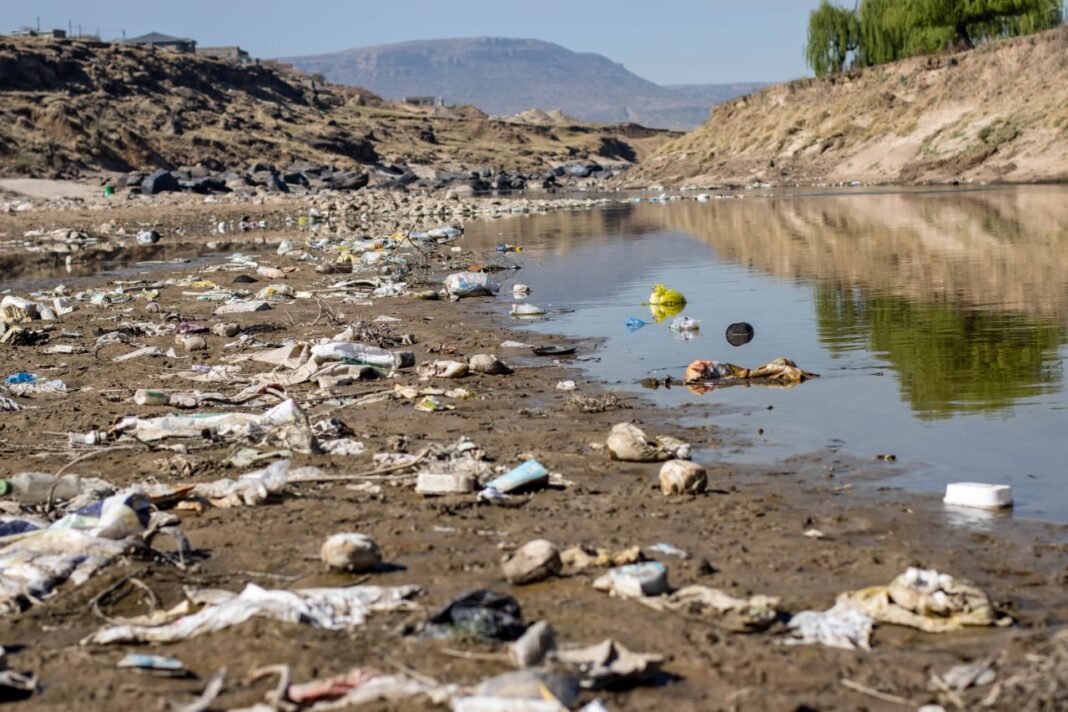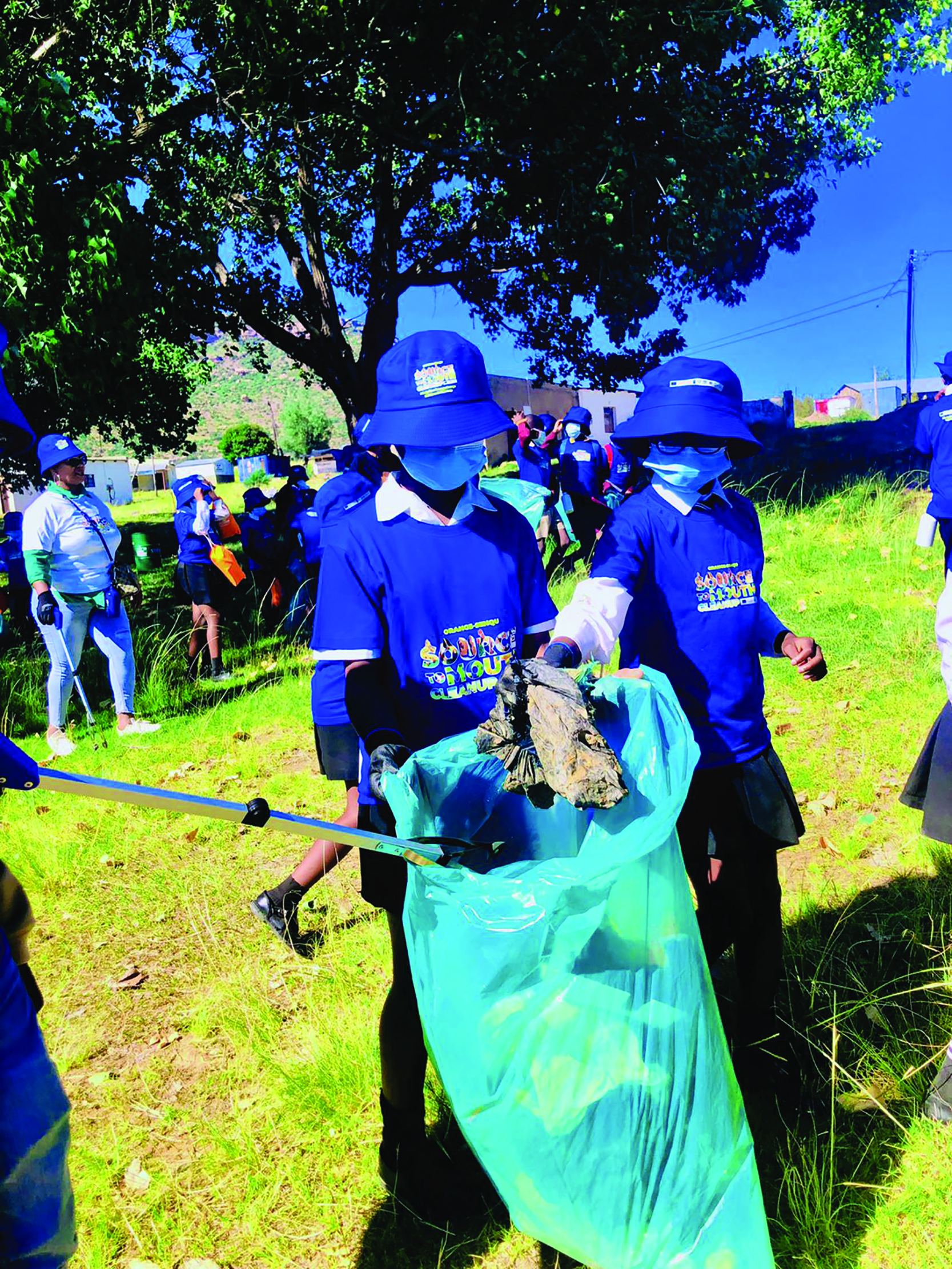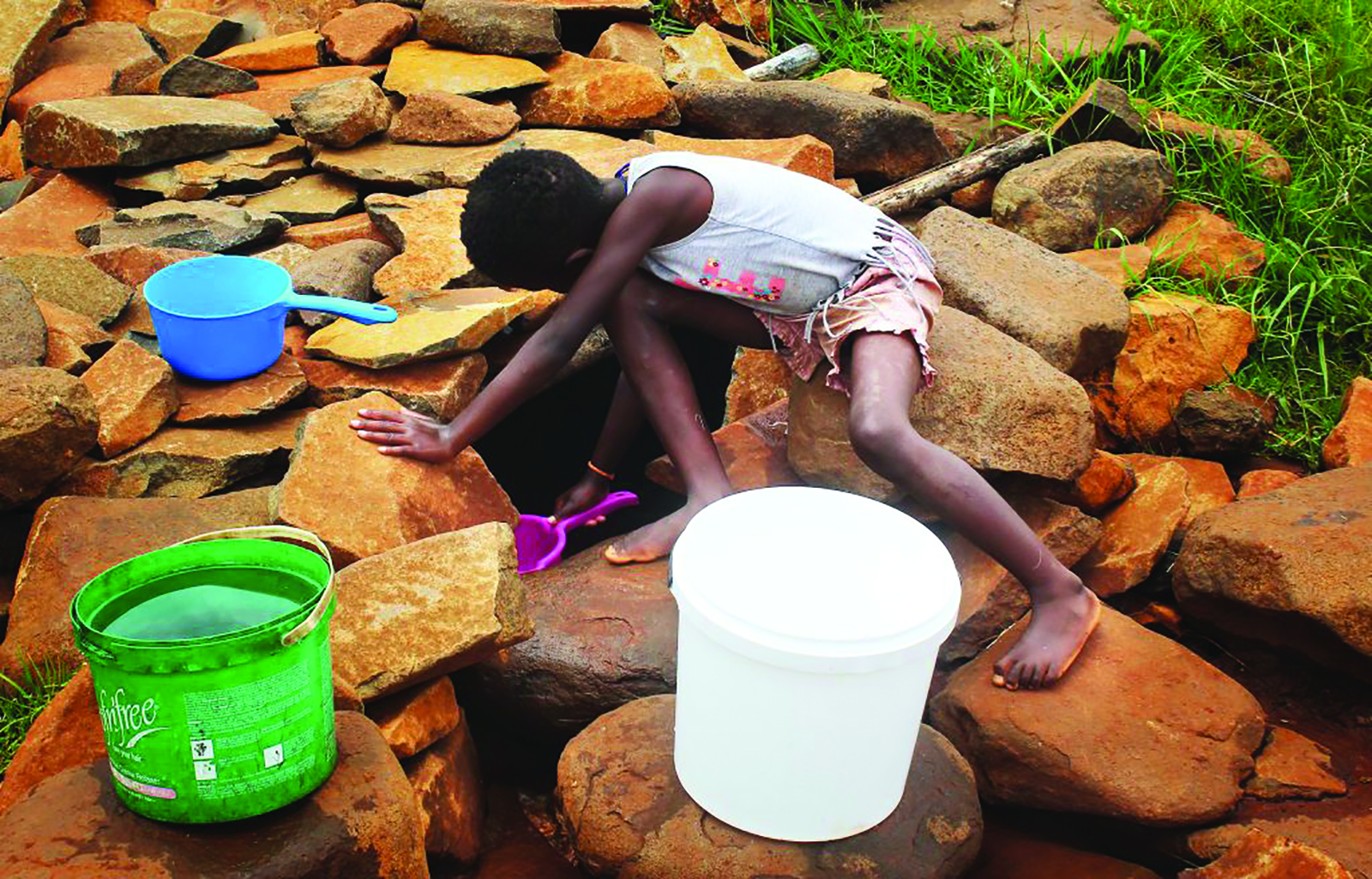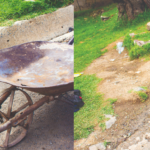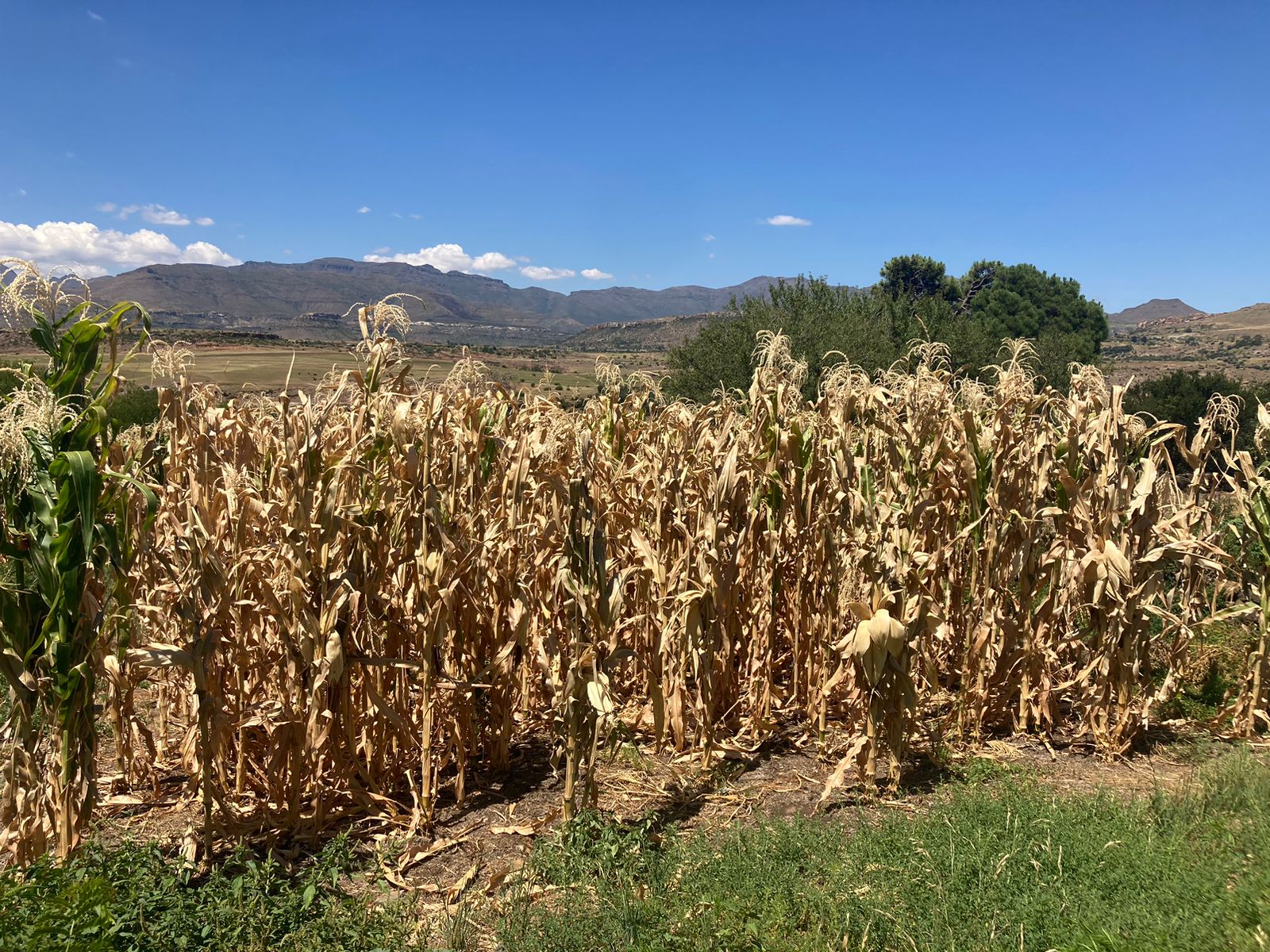…Mohokare River gets cleaned
Lerato Matheka
Disposable nappies lay on the dry bed of the Mohokare River’s Thetsane area, and a stint of smell from the visibly washed away trash slaps hard, but the smiles on the faces of the students are settling.
Mohokare/ Caledon River is a tributary of the Orange-Senqu River and one of the most important river courses in Southern Africa. It stretches over Lesotho, South Africa, and Namibia.
The river’s water quality thus becomes pivotal not only to Lesotho but to other countries that depend on the Orange-Senqu River Basin.
In Lesotho, the river flows through areas that are characterised by textile industries, urban settlements, and agricultural activities in Maseru.
A research paper, Situational analysis of physico-chemical, biochemical and microbiological quality of water along Mohokare River, Lesotho by Peter Chatanga, Victor Ntuli, Eltony Mugomeri, Tumo Keketsi, and Noel V.T. Chikowore, indicates that the wastewater from the textile industries is inadequately treated and the ultimate recipient of this effluent is the Mohokare River; “…therefore, given the ecological and economic importance of the watercourse to Lesotho and other downstream riparian countries, the assessment of its water quality is needed.”
The authors point out that the ever-increasing global human population and the associated industrialisation, agriculture, and urbanisation are putting a high demand on water and decreasing the availability of fresh potable water, and the assignment of the group of 200 school children, from Makebe, Mohokare, Lesia and Sefate Sa Bophelo Primary Schools, based in the Maseru and Berea Districts, who gathered at the Mohokare bank recently was clear, clean the river bank.
Under the initiative of the European Union delegation to Lesotho, schoolchildren were targeted to lead the cleanup campaign.
The goal of the campaign, which complements the global #EUBeachCleanUp, is to emphasise the importance of the responsible disposal of waste and highlight ways to make a positive impact on the environment.
The #EUBeachCleanUp is a campaign organised by the EU, in partnership with the United Nations to raise awareness about plastic pollution, and how human habits impact the ocean. In line with the EU Green Deal, it showcases the EU’s engagement to preserve the blue planet and it consists of clean-up events organised by institutions (EU Delegations and Representations, Europe Direct Centres, United Nations Regional Offices, etc..), NGOs, and citizens.
The activity also attracted ReNoka, the Orange-Senqu River Commission (ORASECOM) Ministry of Natural Resources’ Department of Water Affairs, the Lesotho Lowlands Water Development Project Phase II and III, UNESCO, Maseru Municipal Council, local non-governmental organisations and members of the community.
The Lesotho #EUBeachCleanUp campaign linked to the Orange-Senqu ‘Source to Mouth’ transboundary campaign for primary school students in Lesotho and Namibia meant to raise awareness about plastic pollution and its impact on the health of rivers, water quality, wildlife and the communities who depend on these water resources.
The Orange-Senqu ‘Source to Mouth’ campaign according to Paola Amadei, Head of the European Union Delegation to Lesotho is a dedicated transboundary initiative committed to conserving water and land resources in the basin.
“It forms part of an overall awareness-raising component of the ReNOKA programme which seeks to inform, educate and empower different target groups on rehabilitation and protection of land and water resources,” Amadei explained.
She added that the campaign encompasses various focused efforts such as clean-ups, community and school outreach, an interactive board game for students, competitions, videos and extensive out-of-home promotional activities.
EU Head of the EU Delegation to Lesotho further explained that the campaign aims to raise awareness and to educate students on the environmental challenges of soil erosion, pollution, particularly plastic pollution, as well as river health in the basin from the source, here in Lesotho, all the way to the river mouth in Namibia.
According to the UNDP, Lesotho is grappling with massively growing plastic pollution that harms agricultural activities, affects the environment and general ecosystem, and thereof, hinders tourism development and foreign investments.
The UN continued to note that even natural resources, including ground and surface water sources, are at higher risk of plastic contamination, especially from micro-plastic material pollutants.
As an exporter of water to South Africa and other Southern African nations, gaining around 3% towards its GDP, The UN indicated that water contamination in Lesotho has adverse effects on the country’s natural and economic resources, citing the country’s current waste management practices are unsustainable.
“The objective of the campaign is to create widespread awareness about the issue of plastic pollution through activities in the classroom and on the river,” Amadei said.
He added, “The Mohokare River is a tributary of the mighty Orange-Senqu River but sadly, like many rivers across the world, it has become polluted with plastic and other waste. The action today is meant to raise awareness in the community and in particular among students about the growing problem of plastic pollution and how we can all help by refusing, reducing, reusing and recycling plastic. We want to bring attention also to the impact of actions on the ocean, hence the association with Namibia.”
“One of the key areas that the EU and its partners in Lesotho concentrate their work on is the sustainable management of natural resources including land and water resources. The European Union’s assistance enables citizens to play an important role in Lesotho, promoting social responsibility and participation in community-focused initiatives”, said Amadei.
The Principal of Makebe Primary School, Rapelang Kaibe, stressed the importance of educating children about plastic pollution and the role they can play in reducing waste.
“The health of our environment is vital for the physical and mental wellbeing of our children and society as a whole, so involving the young people in activities such as this one is very important because they grow up fully informed on how they can take care of the environment,” said Kaibe.
Mario Giuseppe Varrenti, European Union Delegation to Lesotho – Head of Cooperation for his part emphasised that the EU’s support in critical areas is vital to improving living standards for the Basotho people and ensuring a sound basis for sustainable socio-economic development.
Why this cleanup initiative
While Lesotho only uses a very small portion of the water in the whole of the Orange-Senqu River Basin, it still plays an important role in the basin as over 40% of the water in the basin is generated by rainfall in Lesotho. This water sustains river ecosystems and livelihoods all the way downstream to Namibia in the lower reaches of the basin.
Water, especially in southern Africa, is deemed a precious natural resource, but it is not only becoming increasingly limited as economies and populations grow, but rainfall is highly variable and unevenly spread across the region, ORASECOM pointed out, citing the frequent droughts, often broken by severe flooding, have affected lives, slowed economic growth, and have posed significant challenges for water managers.
The organisation indicated that the Intensive use of limited water resources has affected their quality and has impacted downstream river ecosystems.
Supporting data from ORASECOM’s Joint Basin Surveys (JBS) has indicated a decline in the water quality of the Orange-Senqu River.
ORASECOM conducted three Joint Basin Surveys (JBS) which revealed that pollution and soil erosion have had an inordinate impact on the health of Lesotho’s river systems and the quality of the water.
Summary
- The authors point out that the ever-increasing global human population and the associated industrialisation, agriculture, and urbanisation are putting a high demand on water and decreasing the availability of fresh potable water, and the assignment of the group of 200 school children, from Makebe, Mohokare, Lesia and Sefate Sa Bophelo Primary Schools, based in the Maseru and Berea Districts, who gathered at the Mohokare bank recently was clear, clean the river bank.
- The Lesotho #EUBeachCleanUp campaign linked to the Orange-Senqu ‘Source to Mouth’ transboundary campaign for primary school students in Lesotho and Namibia meant to raise awareness about plastic pollution and its impact on the health of rivers, water quality, wildlife and the communities who depend on these water resources.
- EU Head of the EU Delegation to Lesotho further explained that the campaign aims to raise awareness and to educate students on the environmental challenges of soil erosion, pollution, particularly plastic pollution, as well as river health in the basin from the source, here in Lesotho, all the way to the river mouth in Namibia.

Your Trusted Source for News and Insights in Lesotho!
At Newsday Media, we are passionate about delivering accurate, timely, and engaging news and multimedia content to our diverse audience. Founded with the vision of revolutionizing the media landscape in Lesotho, we have grown into a leading hybrid media company that blends traditional journalism with innovative digital platforms.


